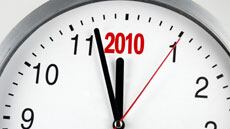
As the 2000s draw to a close, there is a pervasive sense that this decade has been a profound disaster. Writing in The New York Times, columnist Paul Krugman declared it "The Big Zero," citing the decline in private-sector employment, the evaporation of housing wealth, stagnant incomes for working families, and much else besides. This was, we're now told, a Lost Decade, in which the promise of the new millennium was betrayed by speculators and swindlers operating on a grand scale.
One hundred years from now, the first decade of the 21st century will be remembered as the start of an era of global peace and prosperity.
Right at the start, the terror attacks of 2001 created a sense of fear and dread that has never, and perhaps will never, go away. Then there was the invasion of Iraq; the rapid turn from Clinton-era budget surpluses to crippling Bush-era budget deficits; and of course an inside-the-Beltway boom that fattened the pay packets of K Street lobbyists, defense contractors, and armies of ex-politicians while leaving almost everyone else underpaid, overworked, and overcharged by health insurers, cable companies, real estate brokers, colleges and universities, and, in at least some cases, bloated state and local governments. As for the culture, the rise and fall of Britney Spears and Lindsay Lohan sums up the case for the prosecution. It is very easy to see why one would want to drive a stake through the heart of the 2000s and banish its memory for all time.
For all the sublimely horrible things that undoubtedly happened, though, they were more than balanced out by the good things. I'll go even further and argue that 100 years from now, the first decade of the 21st century will be remembered as the start of an era of global peace and prosperity, built in no small part on technologies and cultural innovations that we take for granted.
First, let's cut through the economic doom-and-gloom. There's no denying that Wall Street took America for a ride. There was, however, an upside to a decade of easy credit. The fact that Americans are willing to spend borrowed money on flat-screen televisions and souped-up video game consoles and hybrid electric vehicles has led us to an era of painful deleveraging, one of the things moralistic scolds are quick to condemn about the Big Zero. But this eagerness to buy, buy, buy also helped the country maintain its technological leadership. Economist Amar Bhidé, perhaps the decade's most underappreciated thinker, has argued that one of the key strengths of the American economy is what he calls "venturesome consumption"—the willingness of consumers to try untested new goods and to invest the time and effort necessary to figure out how to use them. The gadget geeks who always have to have the latest and greatest gadgets help the rest of us by creating a large enough market for innovative products to eventually drive prices down to earth. This is in some respects very risky behavior, a small-scale version of the risks taken by entrepreneurs. The geeks are guinea pigs, after all. Yet it means that inventors across the world are striving to create products that can crack the lucrative American market.
The perfect example of venturesome consumption is, of course, iPhone-mania. At first, the iPhone was a way for people to cram a cell phone, iPod, and datebook in the slender pockets of your skinny jeans. With the advent of applications, it's become an infinitely expandable device that is much more like a baby computer than a cellphone on steroids. It's only natural that people are increasingly transitioning from expensive laptops to cheapo netbooks that work on the rare occasions when the iPhone won't do the job. The iPhone is leading us towards an age of constant connectivity. In the not-too-distant future, your phone, smaller than a fingernail or perhaps a strand of hair, will constantly monitor your vital signs, just in case you're on the verge of catching a cold. It will even warn you when an ex is around the corner, sparing you an awkward encounter. And without this low dishonorable decade, it would never have happened. Astonishing increases in the quality of the goods we consume like these won't be captured in crude measurements like GDP, despite the fact that it is a real source of wealth. As grumpy as you might feel on New Year's Eve, would you really want to go back to the bulky CD players, the lousy supermarkets, and the VHS cassettes of yesteryear? Of course not.
In the 2000s, these hard-to-measure sources of wealth represented a large and growing share of total wealth in all rich countries. As Thomas Lemieux has noted, more-educated groups tend to be more unequal than less-educated groups. One simple reason is that preferences vary, and two people who decide to become social workers and live together in Lexington, Kentucky are likely to have a far lower income than a couple that goes into high finance and lives in San Francisco. It's not obvious, however, that the second couple is any better off, not least because the cost of living is so much higher in the Bay Area. Demographer Wendell Cox has pointed to another source of hidden affluence. Though the number of Americans moving between states slowed to a still-high 500,000 in 2009, it reached a torrid pace between 2003 and 2007, when it averaged 900,000. Americans were making the move from high-cost to low-cost metropolitan areas, thus leading to major increases in standard of living and time spent with loved ones. By way of example, a February study from the Center for an Urban Future found that $50,000 in Houston is roughly equivalent to $123,322 in Manhattan. A family could head south, cut its income in half, and still come out ahead. It's hardly surprising that hundreds of thousands decided to do exactly that.
As for the rise of celebutante culture, well, no comment. But let's not forget the fact that the quality of mainstream television and cinema has by any reasonable standard radically improved. Watch an afternoon's worth of Saved by the Bell and you will feel as though you've been lobotomized by a fingerless butcher intent on causing you maximum pain. Watch an afternoon's worth of any Nickelodeon sitcom pitched at today's tweens, like True Jackson, VP, or iCarly, and I dare you not to be delighted by the wit and wisdom on display. And that's just the kids' shows. The endless raves for The Sopranos and Deadwood are richly deserved, as are the kudos for comedies like 30 Rock. The sci-fi blockbuster of 2009, Avatar, crushes 1999's The Phantom Menace under its enormous blue foot. Indie film flourished, while the globalization of entertainment introduced American audiences to a wide variety of foreign influences.
More dramatically, in the 2000s the explosion of file-sharing eventually forced a transformation of popular music, dethroning the small oligopoly of major record labels and empowering a new generation of DIY artists. Owl City, a kid from small-town Minnesota, began his spectacular climb up the pop charts by posting his homemade recordings to his MySpace page. A number of truly brilliant and bizarre musicians, like Chad Vangaalen, took a similar path, although not to the same radio-friendly destination. And that's the whole point—new distribution channels have enabled a larger number of artists and musicians to find audiences and to support themselves by touring, or by adding a modest income from the sale of digital downloads to more-or-less tolerable day-jobs as web designers or prop stylists. This decade saw a turn towards a more diverse and more interesting pop culture.
And we haven't even talked about Facebook, which is taking the youth of Generations Y and Z and melding them into a superintelligent hive-mind that, given time, will solve all of the world's problems. Oh sure, the kids are just using it to gossip and play Sudoku. But social networking tools are allowing them to maintain enormously large circles of friendly acquaintances that transcend boundaries of race and geography, thus fighting the alienation that is inevitably part of a highly mobile, post-traditional society. Despite massive blunders by America's elites, the rest of us have created a solid foundation for a healthier, more creative, more energetic country.
This all assumes, of course, that the Mayan Prophecy of 2012 doesn't come to pass, that humanity isn't annihilated in an orgy of nuclear violence and destruction, or that catastrophic climate change doesn't reduce us to bands of half-starved cannibal nomads out of Cormac McCarthy's The Road. But that sounds like a 2010s kind of problem.
Reihan Salam is a fellow at the New America Foundation and the co-author of Grand New Party.





